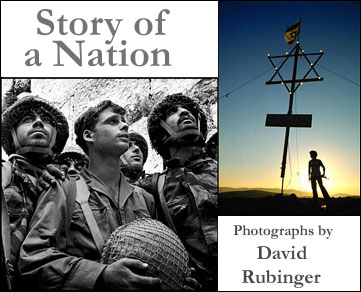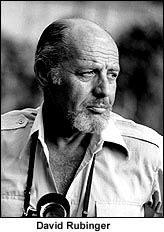 | Presentation of Photographs, text Produced by David Snider |
 | Presentation of Photographs, text Produced by David Snider |
Perhaps the greatest legacy that a photojournalist can leave is a body of work that helps to define a period in history. Matthew Brady and Alexander Gardner did it here in the United States with their coverage of the Civil War. The FSA photographers did it with their depiction of the dust bowl and depression-era America. More recently, Annie Liebowitz continues to document the times in which we live and the people who shape those turning points in our culture. But none has actually presented a totality of work that takes the creation of a nation, and follows it through the decades the way that David Rubinger has done with the state of Israel. David was born in Vienna, and as the stormclouds of Nazi Germany began to form, his father was thrown into Dachau. His mother managed to finally win an entry permit for him to England as a 'butler," and on the condition he leave Germany within two weeks, he was released from the concentration camp. Once in England, he managed to get visas for David and his mother, but it was too late. When war came in September of 1939, David and his mother remained alone in Vienna. She was eventually deported to the death camps at Minsk.
A girl friend gave him an Argus camera. That is when he discovered he was a photographer. At the end of the war, he found out about arranged marriages between survivors of the death camps and Palestinian soldiers. In Germany, he met Anni, who had marched between the extermination camps, and married her in a fictional "certificate wedding" to allow her to go to Israel. They never got divorced. As Israel went through the agonies and triumphs of a nation being born, David was there with his camera. Photographing for local newspapers, and eventually for Time-Life, he was on the front lines of every battle, becoming a friend and confidant of the people whowould eventually become Israel's leaders. His camera never turned away from the problems, recording the blood and tears. Fanatical about the importance of building an archive to preserve the history he had been privileged to see, David has created one of the most important collections in the photographic world. At one point, he watched a young photographer throw some processed negatives, unprotected in the trunk of his car. He grabbed the photographer and shook him. "Don't you realize those photographs are history!" In 1997, David was awarded the Israel Prize, the highest civilian honor given by the State of Israel, in recognition of his dedication to telling the story of a nation. David's good friend and former Picture Editor, Arnold Drapkin of Time, said of David's photographs, "They are the result of talent, sensibilities, and courage - as well as plain, old-fashioned hard work. I was very fortunate to be David's editor for many years, forI saw the world (on a light table) through the viewfinder of his camera...his essential humanity comes through to the viewer in his photographs, and his uncompromising integrity is a legend among his peers." David, Shalom! |
 |
|
Enter the Picture Galleries below
 |  |  |
| Contents | Editorials | The Platypus | Links | Copyright |
| Portfolios | Camera Corner | War Stories | Dirck's Gallery | Comments |
| Issue Archives | Columns | Forums | MailingList | E-mail The DJ |